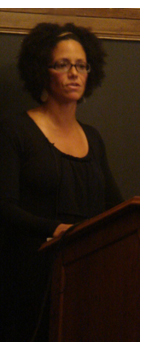| Sun | Mon | Tue | Wed | Thu | Fri | Sat |
|---|---|---|---|---|---|---|
| 1 | 2 | 3 | 4 | 5 | ||
| 6 | 7 | 8 | 9 | 10 | 11 | 12 |
| 13 | 14 | 15 | 16 | 17 | 18 | 19 |
| 20 | 21 | 22 | 23 | 24 | 25 | 26 |
| 27 | 28 | 29 | 30 | 31 |
CATEGORIES
RECENT ENTRIES
BLOG ROLL
A woman’s touch
Five years ago this week, the U.S. military announced that it was investigating reports that American soldiers had abused detainees at Iraq’s Abu Ghraib prison. Soon after, 60 Minutes broadcast photos of the perpetrators in action. Several of the soldiers accused of torturing and humiliating Iraqi prisoners were women—a fact that riveted the New York-based artist and academic Coco Fusco.
 Hoping “to figure out how it was that women had made it into the foreground of this story of torture in the 21st century,” Fusco began a series of creative projects. She spoke about her work last Friday in a campus talk titled “Torture, The Feminine Touch: Exploring Military Interrogation as Intercultural Performance.”
Hoping “to figure out how it was that women had made it into the foreground of this story of torture in the 21st century,” Fusco began a series of creative projects. She spoke about her work last Friday in a campus talk titled “Torture, The Feminine Touch: Exploring Military Interrogation as Intercultural Performance.”
Women comprise 15 percent of the U.S. active-duty armed forces, Fusco found, but up to 35 percent of those engaged in policing and intelligence gathering. Digging further, she was “astonished” to learn that “sexual tactics were used in interrogations and that female sexuality was being transformed into a kind of weapon.”
As she sorted through news stories about women interrogators in Iraq, Fusco recalled: “There was a part of me that said, ‘This is morally wrong.’ And there was a part of me—the performance artist—that said, ‘Well, it may be morally wrong, but it’s incredibly powerful dramatic material.’”
Fusco's artistic response to the Iraq war was to create three works: a performance-lecture called A Room of One’s Own; a short film entitled Project Atropos; and a book, A Field Guide to Female Interrogators. She has also produced related street-theater and museum installations for audiences from Sao Paulo, Brazil, to the Whitney Bienniel.
When asked how she chose her medium, Fusco, who is director of intermedia initiatives at Parsons the New School for Design, gave a straightforward answer. “If I tried to paint something, it would be totally laughable and nobody would care,” she said. “I’m much better at doing performances and making videos and writing. I use the skills that I have.”
Elizabeth Station
The Center for the Study of Race, Politics, and Culture sponsored Coco Fusco’s visit through its artists-in-residence program. Upcoming guests include printmaker Ron Adams (February 3–4) and performer kt shorb (February 18–19).
RELATED LINKS:
RELATED READING:
January 21, 2010
